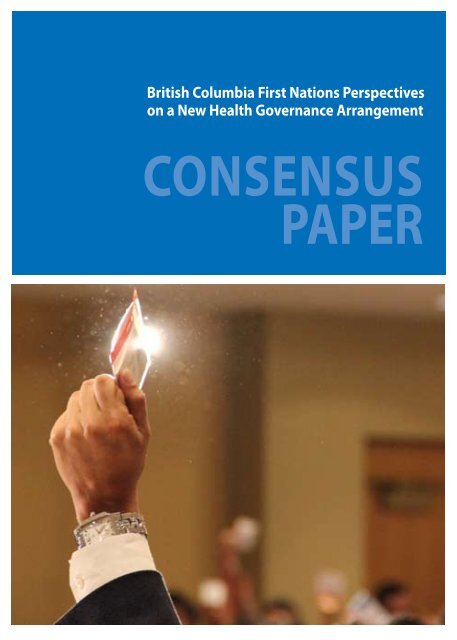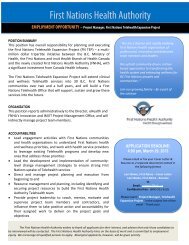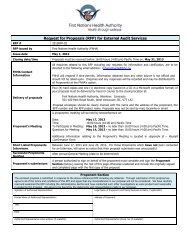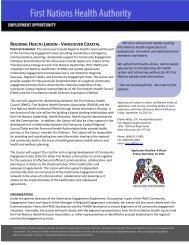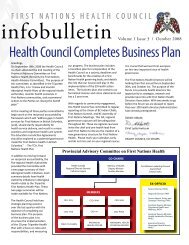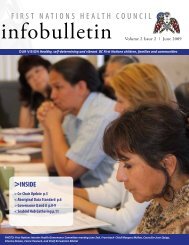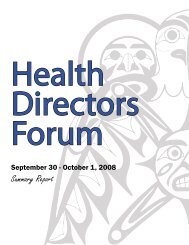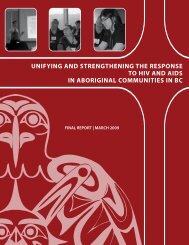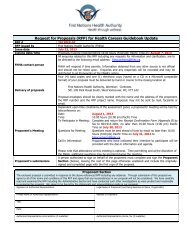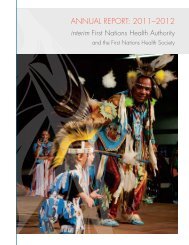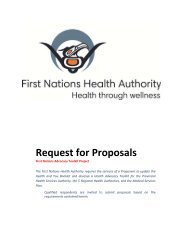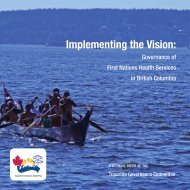FNHC Consensus Paper and Resolution - First Nations Health Council
FNHC Consensus Paper and Resolution - First Nations Health Council
FNHC Consensus Paper and Resolution - First Nations Health Council
- No tags were found...
You also want an ePaper? Increase the reach of your titles
YUMPU automatically turns print PDFs into web optimized ePapers that Google loves.
British Columbia <strong>First</strong> <strong>Nations</strong> Perspectiveson a New <strong>Health</strong> Governance Arrangement<strong>Consensus</strong>PAPER
f r o n t c o v e r i m a g e: Delegate voting at Gathering Wisdom IV May 26th, Richmond BC. This<strong>Consensus</strong> <strong>Paper</strong> <strong>and</strong> resolution were ratified by BC Chiefs at the fourth annual GatheringWisdom for a Shared Journey Forum.
British Columbia <strong>First</strong> <strong>Nations</strong> Perspectiveson a New <strong>Health</strong> Governance Arrangement<strong>Consensus</strong>PAPER1 Background & Introduction2 Directives: Community-Driven, Nation-Based3 Components: Structure of our Structure <strong>and</strong> Authority of Our Authority4 Reciprocal Accountability: Upholding our Commitments5 Next Steps: Where Do We Go From Here?Appendix A: <strong>Consensus</strong> SummaryAppendix B: <strong>Resolution</strong> 2011-01
CONSENSUS PAPERB C <strong>First</strong> <strong>Nations</strong> Perspectives on a New <strong>Health</strong> Governance Arrangementii>> Thank you to all the dedicated Chiefs, leaders,health professionals, <strong>and</strong> community memberswho have attended caucus sessions <strong>and</strong> othermeetings, <strong>and</strong> have offered their leadership <strong>and</strong>shared their wisdom, teachings, songs, prayers,<strong>and</strong> directions at those meetings <strong>and</strong> through the<strong>Health</strong> Partnership Workbook.
HOW DID WE GET HERE?Since 2005, <strong>First</strong> <strong>Nations</strong> in BC, <strong>and</strong> federal <strong>and</strong> provincial governmentshave been committed to a shared agenda through the TransformativeChange Accord to establish a new relationship based on mutualrespect <strong>and</strong> recognition, <strong>and</strong> develop 10-year plans to bridge thedifferences in socio-economic outcomes between <strong>First</strong> <strong>Nations</strong><strong>and</strong> other British Columbians particularly in the areas of: education,housing, economic opportunities, <strong>and</strong> health.In the area of health, progress has been made incrementally througha series of political agreements between <strong>First</strong> <strong>Nations</strong> <strong>and</strong> federal<strong>and</strong> provincial governments including the Transformative ChangeAccord: <strong>First</strong> <strong>Nations</strong> <strong>Health</strong> Plan (2006), <strong>First</strong> <strong>Nations</strong> <strong>Health</strong> PlanMemor<strong>and</strong>um of Underst<strong>and</strong>ing (2006), the Tripartite <strong>First</strong> <strong>Nations</strong><strong>Health</strong> Plan (2007), <strong>and</strong> the Basis for a Framework Agreement on <strong>First</strong>Nation <strong>Health</strong> Governance (2010).In fulfilment of commitments in the Tripartite <strong>First</strong> <strong>Nations</strong> <strong>Health</strong> Plan<strong>and</strong> the Basis for a Framework Agreement on <strong>Health</strong> Governance,<strong>First</strong> <strong>Nations</strong> have directed the <strong>First</strong> <strong>Nations</strong> <strong>Health</strong> <strong>Council</strong>, throughresolutions, to engage in discussions <strong>and</strong> negotiations with federal<strong>and</strong> provincial governments on a new governance arrangement forhealth programs <strong>and</strong> services utilized by <strong>First</strong> <strong>Nations</strong> in BC. This newarrangement will effectively put <strong>First</strong> <strong>Nations</strong> in the driver’s seat whenit comes to their health programs <strong>and</strong> services <strong>and</strong> in an excitingposition of significant influence with respect to the broader healthsystem in BC <strong>and</strong> Canada as it relates to <strong>First</strong> <strong>Nations</strong> health.BACKGROUND AND INTRODUCTION3The new health governance arrangement will be supported by <strong>and</strong>comprised of a number of components, entities, <strong>and</strong> key documents:•• The health governance arrangement will be supported by a strong<strong>and</strong> enduring health partnership between <strong>First</strong> <strong>Nations</strong> <strong>and</strong> federal<strong>and</strong> provincial governments – all committed to a shared vision <strong>and</strong>agenda. A political <strong>Health</strong> Partnership Accord will be developedto describe this partnership in support of <strong>First</strong> <strong>Nations</strong> health.••A legal Tripartite Framework Agreement on <strong>First</strong> Nation <strong>Health</strong>Governance (“Framework Agreement”) to establish commitmentsto transfer the operations of <strong>First</strong> <strong>Nations</strong> <strong>and</strong> Inuit <strong>Health</strong> (FNIH)-BCregion to a <strong>First</strong> <strong>Nations</strong> <strong>Health</strong> Authority, <strong>and</strong> to provide a greaterrole for <strong>First</strong> <strong>Nations</strong> in the broader health system in Canada <strong>and</strong> BCwith respect to <strong>First</strong> <strong>Nations</strong> health needs.
CONSENSUS PAPERB C <strong>First</strong> <strong>Nations</strong> Perspectives on a New <strong>Health</strong> Governance Arrangement4••An Implementation Plan for the Framework Agreement whichwill set out a detailed, staged approach over a number of years tothe transfer of federal programs <strong>and</strong> services to the <strong>First</strong> <strong>Nations</strong><strong>Health</strong> Authority <strong>and</strong> be monitored by a five-year ImplementationCommittee.••A <strong>First</strong> <strong>Nations</strong> <strong>Health</strong> Authority (FNHA) to undertake activities,from a <strong>First</strong> <strong>Nations</strong> perspective, in support of <strong>First</strong> <strong>Nations</strong> health<strong>and</strong> wellness, including planning, designing, managing, funding<strong>and</strong> delivering health programs to better meet <strong>First</strong> <strong>Nations</strong> healthneeds in BC; building relationships with the province <strong>and</strong> regionalhealth authorities; leveraging additional resources; undertakingresearch, collecting data <strong>and</strong> developing policy <strong>and</strong> st<strong>and</strong>ards; <strong>and</strong>supporting <strong>First</strong> <strong>Nations</strong> regional collaboration <strong>and</strong> dialogue.••Five <strong>First</strong> <strong>Nations</strong> Regional Tables <strong>and</strong> Caucuses composed <strong>and</strong>representative of <strong>First</strong> <strong>Nations</strong> leaders <strong>and</strong> health professionals ineach region to serve as regional planning <strong>and</strong> engagement forumsabout health programs <strong>and</strong> services utilized by <strong>First</strong> <strong>Nations</strong>, <strong>and</strong>which will enter into arrangements with regional health authorities<strong>and</strong> the <strong>First</strong> <strong>Nations</strong> <strong>Health</strong> Authority.••The <strong>First</strong> <strong>Nations</strong> <strong>Health</strong> <strong>Council</strong> (<strong>FNHC</strong>) to provide politicalleadership <strong>and</strong> input to: support <strong>and</strong> assist <strong>First</strong> <strong>Nations</strong> inachieving health objectives; health advocacy; research, policy <strong>and</strong>program planning; the implementation of the <strong>First</strong> <strong>Nations</strong> healthplans.••The <strong>First</strong> <strong>Nations</strong> <strong>Health</strong> Directors Association (FNHDA)composed of <strong>Health</strong> Directors <strong>and</strong> managers working in <strong>First</strong><strong>Nations</strong> communities to: support education, knowledge transfer,professional development <strong>and</strong> best practices for health directors<strong>and</strong> managers; <strong>and</strong>, provide advice on research, policy, programplanning <strong>and</strong> design.••The Tripartite Committee on <strong>First</strong> <strong>Nations</strong> <strong>Health</strong> composed ofsenior federal <strong>and</strong> provincial government representatives, <strong>and</strong>representatives of the <strong>FNHC</strong>, <strong>First</strong> <strong>Nations</strong> <strong>Health</strong> Authority, <strong>First</strong><strong>Nations</strong> <strong>Health</strong> Directors Association, <strong>and</strong> <strong>First</strong> <strong>Nations</strong> RegionalTables to: coordinate the planning <strong>and</strong> health services of <strong>First</strong><strong>Nations</strong>, health authorities <strong>and</strong> others; discuss issues relating to<strong>First</strong> <strong>Nations</strong> health <strong>and</strong> wellness including implementation of thehealth plans; <strong>and</strong>, prepare an annual report on progress towardimproving <strong>First</strong> <strong>Nations</strong> health.
DIRECTION AND FEEDBACK FROMBC FIRST NATIONSIn the past three years, more than 120 regional <strong>and</strong> sub-regionalcaucus meetings have taken place to inform the discussions <strong>and</strong>negotiations that <strong>First</strong> <strong>Nations</strong> have directed the <strong>FNHC</strong> to undertakeon all of the above components <strong>and</strong> documents. Through thesecaucus meetings, <strong>First</strong> <strong>Nations</strong> Chiefs, leaders <strong>and</strong> senior healthprofessionals have provided their wisdom, direction, innovation,thoughts <strong>and</strong> perspectives on this new health governanceopportunity.In January 2011, all of the previous feedback from <strong>First</strong> <strong>Nations</strong> wassummarized into a <strong>Health</strong> Partnership Workbook. <strong>First</strong> <strong>Nations</strong>Chiefs, leaders <strong>and</strong> senior health professionals were asked to confirmthe summary of feedback set out in the Workbook <strong>and</strong> share newthoughts <strong>and</strong> perspectives. Each region’s specific feedback into theWorkbook, along with all of their regional caucus discussions withrespect to the various components <strong>and</strong> elements of the new healthgovernance arrangement, was captured in a regional summarydocument. Each region has held further meetings to review <strong>and</strong>confirm its summary document.In April 2011, the <strong>First</strong> <strong>Nations</strong> <strong>Health</strong> <strong>Council</strong> recommended a draftFramework Agreement for approval by <strong>First</strong> <strong>Nations</strong> in BC. TheFramework Agreement was reviewed in detail, along with the regionalsummary reports, at a series of regional, sub-regional <strong>and</strong> other <strong>First</strong><strong>Nations</strong> meetings across BC.BACKGROUND AND INTRODUCTION5In May 2011, the results of the five regional summary documents<strong>and</strong> the notes <strong>and</strong> outcomes of the more than 120 regional <strong>and</strong> subregionalcaucus meetings (including those to review the FrameworkAgreement) were rolled into this <strong>Consensus</strong> <strong>Paper</strong>.
CONSENSUS PAPERB C <strong>First</strong> <strong>Nations</strong> Perspectives on a New <strong>Health</strong> Governance Arrangement6PURPOSEThe purpose of this <strong>Consensus</strong> <strong>Paper</strong> is to clearly articulate thecollective direction <strong>and</strong> feedback given by <strong>First</strong> <strong>Nations</strong> to the<strong>First</strong> <strong>Nations</strong> <strong>Health</strong> <strong>Council</strong> in their work to establish a new healthgovernance arrangement that is community-driven <strong>and</strong> nation-based.By adopting this consensus paper at Gathering Wisdom for a SharedJourney IV, <strong>First</strong> <strong>Nations</strong> will chart a path forward for the future of<strong>First</strong> <strong>Nations</strong> health governance in British Columbia in support of thevision of healthy <strong>and</strong> vibrant BC <strong>First</strong> <strong>Nations</strong> children, families, <strong>and</strong>communities that play an active role in the decision-making regardingtheir personal <strong>and</strong> collective wellness.This <strong>Consensus</strong> <strong>Paper</strong> collates all of the feedback <strong>and</strong> directionprovided by <strong>First</strong> <strong>Nations</strong> for the establishment of the new <strong>First</strong><strong>Nations</strong> health governance arrangement. This <strong>Consensus</strong> <strong>Paper</strong>establishes the collective wisdom <strong>and</strong> direction of <strong>First</strong> <strong>Nations</strong> in BCwith respect to the new health governance arrangement by:•• Describing directives from BC <strong>First</strong> <strong>Nations</strong> for the establishmentof, <strong>and</strong> agreements relating to, the new health governancearrangement.•• Describing the m<strong>and</strong>ates <strong>and</strong> activities of the various entities inthe new health governance arrangement – Regional Caucuses <strong>and</strong>Tables, the FNHA, <strong>FNHC</strong>, <strong>and</strong> the FNHDA.•• Establishing the principles <strong>and</strong> processes of reciprocalaccountability for the success of this new health governancearrangement.••Setting out a clear set of next steps for the <strong>FNHC</strong> to undertake inthe establishment of the new health governance arrangement.>> This <strong>Consensus</strong> <strong>Paper</strong> collates all of the feedback<strong>and</strong> direction provided by <strong>First</strong> <strong>Nations</strong> for theestablishment of a new <strong>First</strong> <strong>Nations</strong> health governancearrangement.
2Community-Directives:Driven, Nation-BasedDIRECTIVE #1:COMMUNITY-DRIVEN, NATION-BASED 9DIRECTIVE #2:INCREASE FIRST NATIONS DECISION-MAKING 9DIRECTIVE #3:IMPROVE SERVICES 10DIRECTIVE #4:FOSTER MEANINGFUL COLLABORATION & PARTNERSHIP 10DIRECTIVE #5:DEVELOP HUMAN AND ECONOMIC CAPACITY 11DIRECTIVE #6:BE WITHOUT PREJUDICE TO FIRST NATIONS INTERESTS 11DIRECTIVE #7:FUNCTION AT A HIGH OPERATIONAL STANDARD 11
Through more than 120 regional <strong>and</strong> sub-regional caucus meetings,<strong>and</strong> more than 250 <strong>Health</strong> Partnership Workbooks, <strong>First</strong> <strong>Nations</strong> in BChave developed the following directives. These directives describethe fundamental st<strong>and</strong>ards <strong>and</strong> instructions for the new healthgovernance relationship.DIRECTIVE #1COMMUNITY-DRIVEN, NATION-BASED•• The community-driven, nation-based principle is overarching <strong>and</strong>foundational to the entire health governance arrangement•• Program, service <strong>and</strong> policy development must be informed <strong>and</strong>driven by the grassroots level•• <strong>First</strong> <strong>Nations</strong> community health agreements <strong>and</strong> programs must beprotected <strong>and</strong> enhanced••Autonomy <strong>and</strong> authority of <strong>First</strong> <strong>Nations</strong> will not be compromisedDIRECTIVE #2:INCREASE FIRST NATIONS DECISION-MAKING AND CONTROL•• Increase <strong>First</strong> <strong>Nations</strong> influence in health program <strong>and</strong> servicephilosophy, design <strong>and</strong> delivery at the local, regional, provincial,national <strong>and</strong> international levelsDIRECTIVES : COMMUNITY-DRIVEN, NATION-BASED9••••••••Develop a wellness approach to health including prioritizing healthpromotion <strong>and</strong> disease <strong>and</strong> injury preventionImplement greater local control over community-level healthservicesInvolve <strong>First</strong> <strong>Nations</strong> in federal <strong>and</strong> provincial decision-makingabout health services for <strong>First</strong> <strong>Nations</strong> at the highest levelsIncrease community-level flexibility in spending decisions to meettheir own needs <strong>and</strong> priorities•• Implement the OCAP (ownership, control, access <strong>and</strong> possession)principle regarding <strong>First</strong> <strong>Nations</strong> health data, including leading <strong>First</strong><strong>Nations</strong> health reporting
•• Enable relationship-building between <strong>First</strong> <strong>Nations</strong> <strong>and</strong> the regionalhealth authorities <strong>and</strong> the <strong>First</strong> <strong>Nations</strong> <strong>Health</strong> Authority withthe goal of aligning health care with <strong>First</strong> <strong>Nations</strong> priorities <strong>and</strong>community health plans where applicableDIRECTIVE #5DEVELOP HUMAN AND ECONOMIC CAPACITY•• Develop current <strong>and</strong> future health professionals at all levels througha variety of education <strong>and</strong> training methods <strong>and</strong> opportunities•• Result in opportunities to leverage additional funding <strong>and</strong>investment <strong>and</strong> services from federal <strong>and</strong> provincial sources for <strong>First</strong><strong>Nations</strong> in BC•• Result in economic opportunities to generate additional resourcesfor <strong>First</strong> <strong>Nations</strong> health programsDIRECTIVE #6BE WITHOUT PREJUDICE TO FIRST NATIONS INTERESTS•• Not impact on Aboriginal Title <strong>and</strong> Rights or the treaty rights of<strong>First</strong> <strong>Nations</strong>, <strong>and</strong> be without prejudice to any self-governmentagreements or court proceedingsDIRECTIVES : COMMUNITY-DRIVEN, NATION-BASED11••••Not impact on the fiduciary duty of the CrownNot impact on existing federal funding agreement with individual<strong>First</strong> <strong>Nations</strong>, unless <strong>First</strong> <strong>Nations</strong> want the agreements to changeDIRECTIVE #7FUNCTION AT A HIGH OPERATIONAL STANDARD••••••••Be accountable, including through clear, regular <strong>and</strong> transparentreportingMake best <strong>and</strong> prudent use of available resourcesImplement appropriate competencies for key roles <strong>and</strong>responsibilities at all levelsOperate with clear governance documents, policies, <strong>and</strong>procedures, including for conflict of interest <strong>and</strong> dispute resolution
CONSENSUS PAPERB C <strong>First</strong> <strong>Nations</strong> Perspectives on a New <strong>Health</strong> Governance Arrangement12
3 AuthorityComponents:Structure of our Structure &of our AuthorityREGIONAL CAUCUSES AND REGIONAL TABLES 16FIRST NATIONS HEALTH COUNCIL 18FIRST NATIONS HEALTH DIRECTORS ASSOCIATION 20FIRST NATIONS HEALTH AUTHORITY 21
The directives set in Section 2 must be met <strong>and</strong> upheld by each of thecomponents described in this section.AGREEMENTSThe new health governance arrangement will be supported by <strong>and</strong>comprised of a number of tripartite agreements including: the legalFramework Agreement; a number of issue-specific sub-agreements;a <strong>Health</strong> Partnership Accord; <strong>and</strong>, Implementation Plan. Therewill be agreements at provincial <strong>and</strong> regional levels between <strong>First</strong><strong>Nations</strong>, regions, <strong>and</strong> <strong>First</strong> <strong>Nations</strong> organizations with health serviceproviders <strong>and</strong> health authorities. A number of other relationship <strong>and</strong>protocol agreements may be developed with key allies <strong>and</strong> partnerorganizations at provincial, regional, <strong>and</strong> local levels.All agreements relating to the new health governance arrangementmust respect <strong>and</strong> uphold the directives in the above section.COMPONENTS: STRUCTURE OF OUR STRUCTURE, AUTHORITY OF OUR AUTHORITY15>> All agreements relating to the new governancearrangement must respect <strong>and</strong> uphold the 7 directives.
CONSENSUS PAPERB C <strong>First</strong> <strong>Nations</strong> Perspectives on a New <strong>Health</strong> Governance Arrangement16REGIONAL CAUCUSES AND REGIONAL TABLESAt the regional level, regional caucuses <strong>and</strong> regional tables will providethe opportunity for community-driven, nation-based decision-making.<strong>First</strong> <strong>Nations</strong> share information <strong>and</strong> perspectives, set direction onregional health matters, <strong>and</strong> appoint their representatives to the <strong>First</strong><strong>Nations</strong> <strong>Health</strong> <strong>Council</strong> through the Regional Caucuses. Regionalcaucuses <strong>and</strong> sub-regional caucuses ensure that <strong>First</strong> <strong>Nations</strong>leadership provide political direction <strong>and</strong> advocacy on behalf oftheir communities <strong>and</strong> <strong>Nations</strong> <strong>and</strong> that this direction feeds into theRegional Tables. Under the new health governance arrangement, thisrole of the Regional Caucuses will continue.Further, each Regional Caucus will be supported to establish aRegional Table composed of a group of regional political leaders <strong>and</strong>health directors that carries out the work m<strong>and</strong>ated by the RegionalCaucus.The Regional Tables will be supported to meet the followingoutcomes:••Engage with <strong>First</strong> <strong>Nations</strong>–– Promote unity, support collaborations <strong>and</strong> relationship buildingamong <strong>First</strong> <strong>Nations</strong>–– Implement effective <strong>and</strong> efficient communications with all <strong>First</strong><strong>Nations</strong> in that region–– Plan <strong>and</strong> undertake engagement with <strong>First</strong> <strong>Nations</strong> in the regionthrough regional caucuses <strong>and</strong> other mechanisms•• Develop <strong>and</strong> implement agreements <strong>and</strong> arrangementsbetween Regional Tables <strong>and</strong> Regional <strong>Health</strong> Authorities–– Enable <strong>First</strong> <strong>Nations</strong> to have greater influence over relevantprogram, service, planning <strong>and</strong> funding decisions of theRegional <strong>Health</strong> Authorities–– Enable greater leveraging of resources–– Set out a shared agenda <strong>and</strong> actions for improving <strong>First</strong> <strong>Nations</strong>health
•• Develop regional perspectives <strong>and</strong> approaches on health <strong>and</strong>wellness–– Develop health programs, services <strong>and</strong> initiatives which can bydelivered by <strong>and</strong> serve the needs of the <strong>First</strong> <strong>Nations</strong> people inthe region–– Roll-up community health planning <strong>and</strong> priorities into regionalhealth plans <strong>and</strong> collaborate with the <strong>FNHC</strong>, the FNHA, theFNHDA <strong>and</strong> the Regional <strong>Health</strong> Authority to implement thoseplans–– Support an agenda for regional data, evidence gathering, <strong>and</strong>review•• Effective, efficient <strong>and</strong> sustainable engagement <strong>and</strong>operations–– Promote membership that is sustainable <strong>and</strong> regionallyrepresentative as determined by the regions–– Operate with approved <strong>and</strong> transparent Terms of Reference,conflict of interest <strong>and</strong> dispute resolution policies <strong>and</strong> processes–– Make efficient <strong>and</strong> effective use of assigned resources foroperating–– Ensure members are well informed <strong>and</strong> skilled for their rolesCOMPONENTS: STRUCTURE OF OUR STRUCTURE, AUTHORITY OF OUR AUTHORITY17
CONSENSUS PAPERB C <strong>First</strong> <strong>Nations</strong> Perspectives on a New <strong>Health</strong> Governance Arrangement18FIRST NATIONS HEALTH COUNCILThe <strong>FNHC</strong> will continue as a provincial-level political <strong>and</strong> advocacyorganization that is representative of <strong>and</strong> accountable to BC <strong>First</strong><strong>Nations</strong>, with the following m<strong>and</strong>ate:•• Dedicated political leadership for the implementation of the<strong>Health</strong> Plans–– Provide continued political leadership for implementation of theTCA: FNHP <strong>and</strong> TFNHP–– Reflect a philosophy <strong>and</strong> culture of trust, unity, honesty, humility,healthy living, traditional practices <strong>and</strong> teachings in operations,planning <strong>and</strong> decision-making•• Support to <strong>First</strong> <strong>Nations</strong> in achieving their health priorities <strong>and</strong>objectives––Support Community-Driven <strong>and</strong> Nation-Based approaches–– Promote individual health <strong>and</strong> wellness responsibilities,including self-care <strong>and</strong> health literacy–– Promote the transfer of health services to local <strong>and</strong> regionallevels wherever possible, practical <strong>and</strong> feasible•• <strong>Health</strong> Advocacy <strong>and</strong> Relationships–– <strong>Health</strong> advocacy, knowledge sharing <strong>and</strong> collaboration withgovernment partners <strong>and</strong> others at the highest levels (includinginternationally)–– Advocacy for service improvements for <strong>First</strong> <strong>Nations</strong>–– Provide a BC <strong>First</strong> <strong>Nations</strong> leadership perspective to research,policy <strong>and</strong> program planning processes related to <strong>First</strong> <strong>Nations</strong>health in BC–– Develop relationships <strong>and</strong> alliances with other <strong>First</strong> <strong>Nations</strong>organizations, government Ministries <strong>and</strong> Departments, <strong>and</strong>others, to achieve progress in the social determinants of health•• Politically oversee the transition of FNIH to a new <strong>First</strong> <strong>Nations</strong><strong>Health</strong> Authority
•• Promote <strong>and</strong> ensure communication, transparency, costeffectiveness<strong>and</strong> accountability of the <strong>FNHC</strong> to <strong>First</strong> <strong>Nations</strong>–– Operate to a good governance st<strong>and</strong>ard including having anapproved <strong>and</strong> transparent Terms of Reference; transparentprocesses; active, participatory members; cost-efficiency;professionalism; regular accountability <strong>and</strong> reporting; on-goingevaluation of the role <strong>and</strong> benefit of the <strong>FNHC</strong>–– Develop <strong>and</strong> implement a robust <strong>and</strong> sustainablecommunications strategy enabled by the Regional Tables<strong>FNHC</strong> membership is regionally-driven by <strong>First</strong> <strong>Nations</strong>. It iscomposed of a total of fifteen members – three members appointedby each of the five regions in BC. Each region determines its ownselection process for its members, including their length of term <strong>and</strong>appointment procedure.COMPONENTS: STRUCTURE OF OUR STRUCTURE, AUTHORITY OF OUR AUTHORITY19
CONSENSUS PAPERB C <strong>First</strong> <strong>Nations</strong> Perspectives on a New <strong>Health</strong> Governance Arrangement20FIRST NATIONS HEALTH DIRECTORS ASSOCIATIONThe FNHDA is composed of health directors <strong>and</strong> managers workingin <strong>First</strong> <strong>Nations</strong> communities <strong>and</strong>: supports education, knowledgetransfer, professional development <strong>and</strong> best practices for healthdirectors <strong>and</strong> managers; <strong>and</strong>, acts as a technical advisory body tothe <strong>FNHC</strong> <strong>and</strong> the FNHA on research, policy, program planning <strong>and</strong>design, <strong>and</strong> the implementation of the <strong>Health</strong> Plans.The FNHDA must have a robust <strong>and</strong> sustainable communicationsstrategy which is implemented through <strong>and</strong> enabled by thecommunity engagement hubs <strong>and</strong> the Regional Tables.The FNHDA must be constituted with good governance,accountability, transparency <strong>and</strong> defined operating st<strong>and</strong>ards.Technical SupportRegional Caucuses& Representatives<strong>First</strong> <strong>Nations</strong><strong>Health</strong> <strong>Council</strong><strong>First</strong> <strong>Nations</strong> <strong>Health</strong>Directors AssociationRegionalRepresentatives<strong>First</strong> <strong>Nations</strong><strong>Health</strong> DirectorsService DeliveryChiefs <strong>and</strong>Tribal LeadersCommunity levelservice deliveryRegionalCollaboration<strong>First</strong> <strong>Nations</strong> <strong>Health</strong>AuthorityPolitical Advocacy
FIRST NATIONS HEALTH AUTHORITYThe final form <strong>and</strong> structure of the FNHA will be developed throughfurther research, analysis, <strong>and</strong> engagement with <strong>First</strong> <strong>Nations</strong>, asled by the <strong>FNHC</strong> in the coming years. To allow adequate time forthis engagement with <strong>First</strong> <strong>Nations</strong> on a permanent structure for anFNHA, the <strong>First</strong> <strong>Nations</strong> <strong>Health</strong> Society will serve as the interim FNHAto begin the early steps in implementing the new health governancearrangement.The FNHA will be a non-profit legal entity, representative of <strong>and</strong>accountable to BC <strong>First</strong> <strong>Nations</strong>.The m<strong>and</strong>ate of the <strong>First</strong> <strong>Nations</strong> <strong>Health</strong> Authority will include:•• Administering the resources currently housed by FNIH-BC Regionfor <strong>First</strong> <strong>Nations</strong> health programs <strong>and</strong> services in BC•• Administering initiatives at a population <strong>and</strong> public health level,including establishing infrastructure for province-wide initiativessuch as data collection <strong>and</strong> information management <strong>and</strong>technology•• Planning, designing, managing, delivering <strong>and</strong> funding <strong>First</strong> <strong>Nations</strong>health programs to carry out other health <strong>and</strong> wellness relatedfunctionsCOMPONENTS: STRUCTURE OF OUR STRUCTURE, AUTHORITY OF OUR AUTHORITY21•• Collaborating with the BC Ministry of <strong>Health</strong> Services <strong>and</strong> <strong>Health</strong>Authorities to coordinate <strong>and</strong> integrate their respective healthprograms <strong>and</strong> services to achieve better outcomes for <strong>First</strong> <strong>Nations</strong>••Influencing the health industry to promote <strong>First</strong> <strong>Nations</strong> inclusion inthe health education system, hospitals, health clinics etc.•• Incorporating <strong>and</strong> promoting <strong>First</strong> <strong>Nations</strong> knowledge, beliefs,values, practices, medicines <strong>and</strong> models of health <strong>and</strong> healing into<strong>First</strong> <strong>Nations</strong> health programs, recognizing regional differences••••Establishing st<strong>and</strong>ards for <strong>First</strong> <strong>Nations</strong> health programsCollecting <strong>and</strong> maintaining clinical information <strong>and</strong> patient records<strong>and</strong> developing protocols for data <strong>and</strong> information sharing
CONSENSUS PAPERB C <strong>First</strong> <strong>Nations</strong> Perspectives on a New <strong>Health</strong> Governance Arrangement•• Modifying <strong>and</strong> redesigning health programs <strong>and</strong> services deliveredby the <strong>First</strong> <strong>Nations</strong> <strong>Health</strong> Authority through a collaborative <strong>and</strong>transparent process with BC <strong>First</strong> <strong>Nations</strong> to better meet theirhealth needs•• Promoting community wellness to advance healthy individuals,families, <strong>and</strong> communities to assist in building community capacity•• Engage BC <strong>First</strong> <strong>Nations</strong> through the Regional Tables with regard toregional <strong>and</strong> local interests <strong>and</strong> health care needs•• Enhancing collaboration among <strong>First</strong> <strong>Nations</strong> health providers <strong>and</strong>others to address economies of scale in service delivery••Carrying out research <strong>and</strong> policy development•• Partnering with Federal <strong>and</strong> Provincial governments <strong>and</strong> healthservice providers to develop <strong>and</strong> redesign health programs,services, policy <strong>and</strong> legislation to meet <strong>First</strong> <strong>Nations</strong> health needs<strong>and</strong> priorities•• Maintaining appropriate financial records <strong>and</strong> preparing financialstatements for audit22Priorities of the <strong>First</strong> <strong>Nations</strong> <strong>Health</strong> Authority must include:A strong, ongoing <strong>and</strong> inclusive engagement process with <strong>First</strong><strong>Nations</strong>•• Addressing service gaps <strong>and</strong> issues of access in relation to therange of essential clinical <strong>and</strong> medical services <strong>and</strong> mental wellnessservices••••••Renovation <strong>and</strong> improvements to the Non-Insured <strong>Health</strong> BenefitsProgram – medical transportation in particularEnsuring the FNHA upholds <strong>and</strong> is founded on <strong>First</strong> <strong>Nations</strong> values<strong>and</strong> approachesInitiatives which strengthen health literacy <strong>and</strong> self-care•• Targeting economic <strong>and</strong> shared services opportunities to generate<strong>and</strong> leverage additional funds to invest in <strong>First</strong> <strong>Nations</strong> health
•• Addressing funding requirements for capital, infrastructure, facilities<strong>and</strong> equipment••Supporting health human resource development•• Providing <strong>and</strong> supporting cross-cultural training for non-<strong>First</strong><strong>Nations</strong> staff delivering services for <strong>First</strong> <strong>Nations</strong> families <strong>and</strong>communities••Establishing a <strong>First</strong> <strong>Nations</strong> Deputy Provincial <strong>Health</strong> Officer•• Supporting opportunities to build <strong>First</strong> <strong>Nations</strong> capacity atcommunity, regional, <strong>and</strong> provincial levels•• Realize efficiencies in the management of federal programs <strong>and</strong>services to reinvest in <strong>First</strong> <strong>Nations</strong> healthThe FNHA must be constituted with good governance, accountability,transparency <strong>and</strong> defined operating st<strong>and</strong>ards <strong>and</strong> governed by aBoard of Directors with experience in <strong>First</strong> <strong>Nations</strong> health programs<strong>and</strong> services <strong>and</strong> successfully running a large operation.COMPONENTS: STRUCTURE OF OUR STRUCTURE, AUTHORITY OF OUR AUTHORITY23>> The FNHA must be constituted with good governance,accountability, transparency <strong>and</strong> defined operatingst<strong>and</strong>ards <strong>and</strong> governed by a Board of Directors withexperience in <strong>First</strong> <strong>Nations</strong> health programs <strong>and</strong>services <strong>and</strong> successfully running a large operation.
4 Accountability:Upholding Our Commitments
Reciprocal accountability means shared responsibility – amongst <strong>First</strong><strong>Nations</strong> (at community, regional <strong>and</strong> provincial levels), the FederalGovernment, <strong>and</strong> the Provincial Government (including <strong>Health</strong>Authorities) – to achieve common goals.Historically, accountability has been a one way relationship from<strong>First</strong> <strong>Nations</strong> to governments for funds received. Under the newhealth governance arrangement, accountability is much broader<strong>and</strong> not just about money. It is about working together <strong>and</strong> eachParty being responsible for the effective operation of their part ofthe health system recognizing that the space occupied by each isinterdependent <strong>and</strong> interconnected.The principles that will guide reciprocal accountability are:•• Clear roles <strong>and</strong> responsibilities for the partners–– Roles <strong>and</strong> responsibilities are well understood <strong>and</strong> agreed on asit relates to the implementation of the <strong>Health</strong> Plans•• Clear performance expectations–– The objectives, expected accomplishments, <strong>and</strong> the constraints,such as resources – are be explicit, understood <strong>and</strong> agreed on•• Balanced expectations based on capacities–– Performance expectations are be linked to <strong>and</strong> balanced witheach party’s capacity to deliverRECIPROCAL ACCOUNTABILITY27•• Credible reporting–– Credible <strong>and</strong> timely information is reported to demonstrate whathas been achieved, whether the means used were appropriate<strong>and</strong> what has been learned;–– Reporting is streamlined <strong>and</strong> efficient between the partners•• Reasonable review <strong>and</strong> adjustment–– Fair <strong>and</strong> informed review <strong>and</strong> feedback on performanceis carried out by the parties, achievements <strong>and</strong> difficultiesrecognized, appropriate corrective action taken <strong>and</strong> appropriateconsequences carried out
CONSENSUS PAPERB C <strong>First</strong> <strong>Nations</strong> Perspectives on a New <strong>Health</strong> Governance Arrangement28••–– Review occurs at least annually <strong>and</strong> include evaluation <strong>and</strong> costeffectivenessof investmentsEthics––Based on cultural teachings <strong>and</strong> best practicesProcesses for reciprocal accountability will look different at each level<strong>and</strong> forum <strong>and</strong> may include:••Community Level––Collaboration between political leaders <strong>and</strong> health technicians–– <strong>First</strong> <strong>Nations</strong> individuals <strong>and</strong> communities supporting their ownhealth <strong>and</strong> well-being, <strong>and</strong> underst<strong>and</strong>ing how their actionsimpact <strong>First</strong> <strong>Nations</strong> health programs <strong>and</strong> services for all <strong>First</strong><strong>Nations</strong> in BC–– <strong>First</strong> <strong>Nations</strong> political <strong>and</strong> technical leaders actively contributingto the implementation of the <strong>Health</strong> Plans including byparticipating in their Regional Caucus–– Accountability of <strong>First</strong> <strong>Nations</strong> political <strong>and</strong> technical leaders totheir respective communities for funding, services, professionalst<strong>and</strong>ards, cultural teachings, best practices <strong>and</strong> ethics <strong>and</strong> costefficiency••Regional Level–– Regional Caucus sessions including all <strong>First</strong> <strong>Nations</strong> <strong>and</strong> theirhealth organizations to report on progress, share information,<strong>and</strong> develop common positions <strong>and</strong> perspectives for theRegional Table to advance–– Establishment of Regional Tables to advance a united, effective,<strong>and</strong> sustainable approach for the region–– Regional collaborations, partnerships <strong>and</strong> agreements betweenRegional Tables with Regional <strong>Health</strong> Authorities <strong>and</strong> the <strong>First</strong><strong>Nations</strong> <strong>Health</strong> Authority to share responsibility <strong>and</strong> decisionmakingfor health services to <strong>First</strong> <strong>Nations</strong>
••Provincial / National Level–– Regular meetings of the Tripartite Committee on <strong>First</strong> <strong>Nations</strong><strong>Health</strong> to measure progress of the <strong>Health</strong> Plans <strong>and</strong> discusspotential changes to roles, powers or funding that may berequired–– Regular senior political <strong>and</strong> technical meetings with keydecision-makers at national <strong>and</strong> provincial levels to focus on BC<strong>First</strong> <strong>Nations</strong> health priorities <strong>and</strong> plans–– Effective, respectful, <strong>and</strong> sustainable working partnershipsbetween the <strong>First</strong> <strong>Nations</strong> <strong>Health</strong> <strong>Council</strong>, <strong>First</strong> <strong>Nations</strong> <strong>Health</strong>Directors Association, <strong>and</strong> <strong>First</strong> <strong>Nations</strong> <strong>Health</strong> Authority for thebenefit of <strong>First</strong> <strong>Nations</strong> health <strong>and</strong> wellness in BCRECIPROCAL ACCOUNTABILITY29
5Next Steps:Where Do We Go From Here?
By adopting this consensus paper, <strong>First</strong> <strong>Nations</strong> in BC chart a pathforward for the future of <strong>First</strong> <strong>Nations</strong> health governance.Through this paper, <strong>First</strong> <strong>Nations</strong> set the st<strong>and</strong>ards <strong>and</strong> requirementsfor how the new health governance structure must operate at thecommunity, regional <strong>and</strong> provincial levels. <strong>First</strong> <strong>Nations</strong> also clearlyestablish <strong>and</strong> reinforce the m<strong>and</strong>ates <strong>and</strong> activities of the <strong>FNHC</strong>,FNHDA <strong>and</strong> FNHA.Support for this consensus paper will show British Columbia <strong>First</strong><strong>Nations</strong> support <strong>and</strong> approval for the <strong>FNHC</strong> to move forward in thedevelopment <strong>and</strong> finalization of the documents necessary to developa new health governance structure, including the legally-bindingFramework Agreement <strong>and</strong> a <strong>Health</strong> Partnership Accord with Federal<strong>and</strong> Provincial governments. These <strong>and</strong> any agreements or structuresrelating to the new <strong>First</strong> <strong>Nations</strong> health governance arrangement mustbe consistent with the st<strong>and</strong>ards <strong>and</strong> requirements set out in thisconsensus paper.Next Steps for the <strong>First</strong> <strong>Nations</strong> <strong>Health</strong> <strong>Council</strong> (<strong>FNHC</strong>):•• Tripartite Framework Agreement on <strong>First</strong> Nation <strong>Health</strong>Governance (Framework Agreement) <strong>and</strong> sub-agreements:–– The Framework Agreement has been recommended to <strong>First</strong><strong>Nations</strong> for approval, <strong>and</strong> federal <strong>and</strong> provincial governments areconsidering its approval as well.–– The Framework Agreement is consistent with this consensuspaper. All sub-agreements must be consistent with theFramework Agreement <strong>and</strong> this consensus paper.–– Upon approval of this consensus paper, the <strong>FNHC</strong> will direct theBoard of Directors of the <strong>First</strong> <strong>Nations</strong> <strong>Health</strong> Society to sign theFramework Agreement.–– Following signing of the Framework Agreement, the <strong>FNHC</strong>will develop a strategy <strong>and</strong> approach for the conclusion ofsub-agreements <strong>and</strong> share this strategy <strong>and</strong> approach with <strong>First</strong><strong>Nations</strong> for feedback.NEXT STEPS33
CONSENSUS PAPERB C <strong>First</strong> <strong>Nations</strong> Perspectives on a New <strong>Health</strong> Governance Arrangement34••••<strong>Health</strong> Partnership Accord–– The <strong>Health</strong> Partnership Accord is in development. Its purpose isto situate the Framework Agreement within a broader contextof partnership amongst the Parties <strong>and</strong> set out their sharedvision <strong>and</strong> expected outcomes for a longst<strong>and</strong>ing, enduringpartnership in support of <strong>First</strong> <strong>Nations</strong> health.–– The <strong>Health</strong> Partnership Accord must be consistent with thisconsensus paper.–– Upon approval of this consensus paper, the <strong>FNHC</strong> will engagewith federal <strong>and</strong> provincial governments to finalize the <strong>Health</strong>Partnership Accord.Implementation Plan–– An implementation plan will set out a staged <strong>and</strong> plannedapproach to the implementation of the Framework Agreement.–– The implementation plan must be consistent with theFramework Agreement <strong>and</strong> this consensus paper.–– Following approval of this consensus paper <strong>and</strong> the signing ofthe Framework Agreement, the <strong>FNHC</strong> will engage with federal<strong>and</strong> provincial governments to prepare the implementation plan<strong>and</strong> strike the tripartite Implementation Committee.••<strong>First</strong> <strong>Nations</strong> <strong>Health</strong> Authority–– Significant technical work is required to develop models <strong>and</strong>considerations for the development of a permanent FNHA, <strong>and</strong>further engagement with <strong>First</strong> <strong>Nations</strong> in required on thesemodels <strong>and</strong> considerations.–– The <strong>First</strong> <strong>Nations</strong> <strong>Health</strong> Society will serve as the interim FNHAto begin the early work in implementing this new healthgovernance arrangement.–– Any interim or permanent structure of the FNHA must beconsistent with the Framework Agreement <strong>and</strong> this consensuspaper.–– Following approval of this consensus paper <strong>and</strong> the signingof the Framework Agreement, the <strong>FNHC</strong> will provide politicalleadership to develop models <strong>and</strong> options for an FNHA thatmeet the st<strong>and</strong>ards <strong>and</strong> requirements set out in this consensuspaper.
–– Following approval of this consensus paper <strong>and</strong> the signing ofthe Framework Agreement, the <strong>FNHC</strong> will direct the <strong>First</strong> <strong>Nations</strong><strong>Health</strong> Society to take steps to amend its bylaws to become theinterim FNHA <strong>and</strong> begin the early steps in implementing thenew health governance arrangement.••••Regional Tables–– Support must be provided to each Regional Caucus to furtherdevelop its own processes <strong>and</strong> structures, <strong>and</strong> to engage inrelationship-building with the Regional <strong>Health</strong> Authority.–– The Regional Tables must be consistent with this consensuspaper.–– Following approval of this consensus paper, the <strong>FNHC</strong> regionalrepresentatives will support their Regional Caucuses to developRegional Tables.Engagement with <strong>and</strong> Accountability to <strong>First</strong> <strong>Nations</strong>–– A high st<strong>and</strong>ard of engagement <strong>and</strong> accountability has beenset in the <strong>First</strong> <strong>Nations</strong> <strong>Health</strong> <strong>Council</strong> process – this consensuspaper does not mark the end of engagement, but only a keydecision point in the process–– The engagement <strong>and</strong> accountability process moving forwardmust be consistent with this consensus paper–– Following approval of this consensus paper, the <strong>FNHC</strong> willcontinue to engage with <strong>and</strong> be accountable to <strong>First</strong> <strong>Nations</strong>through a variety of mechanisms including: Regional Caucuses,Gathering Wisdom for a Shared Journey forums; presentationsto other provincial <strong>First</strong> <strong>Nations</strong> leadership organizations; annualreports; communiqués; online <strong>and</strong> digital media; <strong>and</strong> manyothers.–– Following approval of this consensus paper, the <strong>FNHC</strong> willcontinue to inform <strong>and</strong> seek approval of <strong>First</strong> <strong>Nations</strong> at keydecision points for the new <strong>First</strong> Nation health governancearrangement, including the strategy <strong>and</strong> plan for the negotiationof sub-agreements <strong>and</strong> the structure of an FNHA.RECIPROCAL ACCOUNTABILITY35
APPENDIXA<strong>Consensus</strong>Summary
The content of this <strong>Consensus</strong> <strong>Paper</strong> is a direct result of this feedbackprovided by <strong>First</strong> <strong>Nations</strong>. This section provides a short summaryof that feedback as provided by <strong>First</strong> <strong>Nations</strong> through regional <strong>and</strong>sub-regional caucus meetings <strong>and</strong> through the <strong>Health</strong> PartnershipWorkbook.Community Level Governance PrinciplesIn total 85% of participants in the 2011 <strong>Health</strong> Partnership Workbookprocess agreed with the proposed principles for community levelgovernance <strong>and</strong> proposed the following additional principles:••••••••••••••Applying Community-Driven Nation-Based approaches;Addressing service gaps in communities;Promoting traditional medicines, practices <strong>and</strong> teachings in communities;<strong>Health</strong> human resource development for communities;Evaluating progress, outcomes <strong>and</strong> data collection in order to assistdecision-making that will benefit the community;Ensuring accountability <strong>and</strong> transparency to communities <strong>and</strong><strong>Nations</strong>; <strong>and</strong>Addressing funding issues faced by communities.APPENDIX39Regional Level Governance PrinciplesIn total 89% of participants in the workbook process agreed with theproposed principles for regional level governance.Provincial Level Governance PrinciplesIn total 90% of participants in the workbook process agreed with theproposed principles for provincial level governance. It was proposedthat a focus on social determinants of health be added to ensure therewas cooperation with other government Ministries <strong>and</strong> Departments.Reciprocal AccountabilityParticipants supported the proposed principles <strong>and</strong> recommendedthat further requirements be implemented for ‘credible reporting’ <strong>and</strong>‘review <strong>and</strong> adjustment’.Participants were asked about processes for reciprocal accountability<strong>and</strong> the main themes were:
CONSENSUS PAPERB C <strong>First</strong> <strong>Nations</strong> Perspectives on a New <strong>Health</strong> Governance Arrangement••••••Training <strong>and</strong> development;Funding Security;Conflict of Interest;•• Adding an Ethics process (including possibly an Elders <strong>Council</strong> forthis purpose); <strong>and</strong>•• Accountability.Regional CaucusesA total of 84% of participants agreed that they would like to see theRegional Caucus structure continue as part of the new regional healthtransfer process with the purposes described in the workbook. Generallyit was considered that Caucuses undertake the following functionswell:•• Networking, communication <strong>and</strong> information disseminationincluding bringing together representation from communities <strong>and</strong>promoting unity <strong>and</strong> collaboration to find common ground;••Helping to build <strong>Health</strong> Authority relationships;40••••Conducting an advocacy role; <strong>and</strong>Promoting unity.The key areas for improvement included:•• Communication <strong>and</strong> Information dissemination (not reaching allcommunities <strong>and</strong> not using a variety of methods especially to reachthose without technology);•• Improving accountability mechanisms;•• Providing evidence of the cost – benefit of Caucuses;•• Ensuring the Caucus has the right skills <strong>and</strong> expertise; <strong>and</strong>•• Ensuring appropriate, diverse representation.
<strong>First</strong> <strong>Nations</strong> <strong>Health</strong> <strong>Council</strong>Participants felt that the following principles <strong>and</strong> roles for the m<strong>and</strong>ate<strong>and</strong> the structure of the <strong>FNHC</strong> should be added to those proposed inthe workbook:••••••••••••Accountability for communication <strong>and</strong> information disseminationto all communities;A leadership role to build relationships with the other pillars of <strong>First</strong><strong>Nations</strong> health governance (FNHA, FNHDA);Inclusion of <strong>First</strong> <strong>Nations</strong> decision-making practices <strong>and</strong> processes;Appropriate representation on the <strong>FNHC</strong>;Appropriate numbers of seats on the <strong>FNHC</strong>; <strong>and</strong>Improved transparency <strong>and</strong> accountability of the <strong>FNHC</strong>.<strong>First</strong> <strong>Nations</strong> <strong>Health</strong> Directors AssociationOverall 89% of participants agreed that the FNHDA should play a keyrole in providing technical advice <strong>and</strong> guidance to the <strong>FNHC</strong> <strong>and</strong> theFNHA <strong>and</strong> added that two key areas need to be addressed – communications<strong>and</strong> membership processes.<strong>First</strong> <strong>Nations</strong> <strong>Health</strong> AuthorityOverall 92% of participants agreed that the proposed principles forthe activities <strong>and</strong> operations of the FNHA should be as listed in theworkbook, with 8% disagreeing. Participants felt that the followingprinciples for activities <strong>and</strong> operations needed to be added:APPENDIX41•• M<strong>and</strong>ate of the FNHA: traditional <strong>and</strong> cultural perspectives; socialdeterminants of health; supporting community <strong>and</strong> regional healthplanning <strong>and</strong> relationships with RHAs; <strong>and</strong>,••Board of Directors of the FNHA: experience <strong>and</strong> expertise in operations<strong>and</strong> in <strong>First</strong> <strong>Nations</strong> health; diversity; <strong>and</strong> inclusiveness.
APPENDIXB<strong>Resolution</strong>#2011-01
<strong>Resolution</strong> #2011-01<strong>First</strong> <strong>Nations</strong> <strong>Health</strong> <strong>Council</strong> Chiefs in AssemblyGathering Wisdom for a Shared Journey IVMay 26, 2011Richmond, BCSUBJECT: APPROVALS FOR NEW FIRST NATIONS HEALTH GOVERNANCEARRANGEMENTWHEREASA. In 2005, the <strong>First</strong> <strong>Nations</strong> Leadership <strong>Council</strong>, Government of Canada, <strong>and</strong> Provinceof British Columbia signed the Transformaive Change Accord, committing to establish:a new relationship based on mutual respect <strong>and</strong> recognition; <strong>and</strong>, 10-year plans tobridge the differences in socio-economic outcomes between <strong>First</strong> <strong>Nations</strong> <strong>and</strong> otherBritish Columbians particularly in the areas of education, housing, economic opportunities,<strong>and</strong> health.B. In 2006, the Transformative Change Accord: <strong>First</strong> <strong>Nations</strong> <strong>Health</strong> Plan (TCA: FNHP) wasreached between the <strong>First</strong> <strong>Nations</strong> Leadership <strong>Council</strong> <strong>and</strong> the Province of BritishColumbia. This plan described a series of actions to improve <strong>First</strong> <strong>Nations</strong> health overa 10-year period. At the same time, a <strong>First</strong> <strong>Nations</strong> <strong>Health</strong> Plan Memor<strong>and</strong>um of Underst<strong>and</strong>ing(“MoU”) was signed by the <strong>First</strong> <strong>Nations</strong> Leadership <strong>Council</strong>, Governmentof Canada, <strong>and</strong> Province of British Columbia; this MoU demonstrated Canada’ssupport for the TCA: FNHP <strong>and</strong> committed the Parties to negotiate a tripartite <strong>First</strong><strong>Nations</strong> health plan. These agreements were supported by resolutions (FNS 0307.07<strong>and</strong> UBCIC 2007-06).C. In 2007, the Tripartite <strong>First</strong> <strong>Nations</strong> <strong>Health</strong> Plan (TFNHP) was signed by the <strong>First</strong> <strong>Nations</strong>Leadership <strong>Council</strong>, Government of Canada, <strong>and</strong> Province of British Columbia<strong>and</strong> supported by resolutions (BCAFN 7/2007, FNS 0907.09). This 10-year plansupported the health actions set out in the TCA: FNHP <strong>and</strong> established new commitmentsto create <strong>and</strong> implement a new structure for the governance of <strong>First</strong> <strong>Nations</strong>health services in British Columbia including: a <strong>First</strong> <strong>Nations</strong> <strong>Health</strong> <strong>Council</strong> to providepolitical <strong>First</strong> <strong>Nations</strong> leadership; a <strong>First</strong> <strong>Nations</strong> <strong>Health</strong> Governing Body (<strong>First</strong><strong>Nations</strong> <strong>Health</strong> Authority) to manage <strong>First</strong> <strong>Nations</strong> health programs <strong>and</strong> services currentlyadministered by the federal government ; <strong>and</strong>, a <strong>First</strong> <strong>Nations</strong> <strong>Health</strong> DirectorsAssociation to support capacity development, training <strong>and</strong> knowledge transfer.D. In 2007, <strong>First</strong> <strong>Nations</strong> Chiefs <strong>and</strong> leaders in BC, through resolutions created <strong>and</strong>made appointments to the <strong>First</strong> <strong>Nations</strong> <strong>Health</strong> <strong>Council</strong> (including but not limitedto BCAFN 6/2007, FNS 0907.10, UBCIC 2008-5). The <strong>First</strong> <strong>Nations</strong> <strong>Health</strong> <strong>Council</strong>was composed of three appointees each of the <strong>First</strong> <strong>Nations</strong> Summit <strong>and</strong> Union ofBC Indian Chiefs, <strong>and</strong> one appointee of the BC Assembly of <strong>First</strong> <strong>Nations</strong> <strong>and</strong> wasm<strong>and</strong>ated with: serving as the advocacy voice of BC <strong>First</strong> <strong>Nations</strong> in achievingtheir health priorities <strong>and</strong> objectives; conducting health-related policy analysis <strong>and</strong>research; participating in policy <strong>and</strong> program planning processes related to <strong>First</strong><strong>Nations</strong> health; <strong>and</strong> providing political leadership in the implementation of the TCA:FNHP, MoU, <strong>and</strong> TFNHP <strong>and</strong> the vision of healthy, self-determining <strong>and</strong> vibrant BC<strong>First</strong> <strong>Nations</strong> children, families <strong>and</strong> communities.
E. On September 13, 2007, the member States of the United <strong>Nations</strong> voted overwhelminglyin favour of the United <strong>Nations</strong> Declaration on the Rights of Indigenous Peoples.The Declaration is the most comprehensive, universal international human rightsinstrument explicitly addressing the rights of Indigenous peoples. It sets minimumst<strong>and</strong>ards for upholding the economic, social, cultural, political, spiritual <strong>and</strong> environmentalrights of Indigenous peoples worldwide. The Government of Canada issueda Statement of Support endorsing the United <strong>Nations</strong> Declaration on the Rightsof Indigenous Peoples on November 12, 2010.F. In January 2008, a BC <strong>First</strong> <strong>Nations</strong> Interim <strong>Health</strong> Governance Committee (FNIHGC)was formed to provide undivided political focus on the health governance commitmentsof the TFNHP <strong>and</strong> work in collaboration with the <strong>First</strong> <strong>Nations</strong> <strong>Health</strong> <strong>Council</strong>,which focused on the other health actions <strong>and</strong> commitments of the TCA: FNHP<strong>and</strong> TFNHP. The FNIHGC Co-Chairs were appointed by the <strong>First</strong> <strong>Nations</strong> Leadership<strong>Council</strong> <strong>and</strong> the FNIHGC was composed of <strong>First</strong> <strong>Nations</strong> representatives appointedby <strong>First</strong> <strong>Nations</strong> in the five regions – Fraser, Interior, North, Vancouver Coastal, <strong>and</strong>Vancouver Isl<strong>and</strong>.G. In 2008, the FNIHGC commenced a regional caucus process to inform <strong>and</strong> obtainfeedback from BC <strong>First</strong> <strong>Nations</strong> on the implementation of the health governancecommitments of the TFNHP, supported by <strong>First</strong> <strong>Nations</strong> by resolution (BCAFN29/2008; FNS 0608.22; UBCIC 2008-25). Regional caucus meetings were held acrossthe province, open to all 203 BC <strong>First</strong> Nation communities, <strong>and</strong> particularly focusingon engagement with each Chief <strong>and</strong> Senior <strong>Health</strong> Lead from each <strong>First</strong> Nationcommunity. These regional caucus sessions, <strong>and</strong> the work of the FNIHGC, resultedin a set of negotiating principles – developed by <strong>First</strong> <strong>Nations</strong> – to guide the tripartitenegotiations to establish a new <strong>First</strong> <strong>Nations</strong> health governance arrangement.H. In 2009, the FNIHGC engaged in negotiations with federal <strong>and</strong> provincial governmentspursuant to the commitments in the TFNHP to establish a new healthgovernance structure for <strong>First</strong> <strong>Nations</strong> health services in BC, <strong>and</strong> consistent withthe negotiating principles developed by <strong>First</strong> <strong>Nations</strong>. These tripartite negotiationsresulted in the British Columbia Tripartite <strong>First</strong> <strong>Nations</strong> <strong>Health</strong> – Basis for a FrameworkAgreement on <strong>Health</strong> Governance (“Basis Agreement”). The Basis Agreement sets outareas of agreement amongst the Parties, <strong>and</strong> the parameters for the negotiation offurther agreements, with respect to the establishment of a new <strong>First</strong> Nation healthgovernance structure.I. In 2009, the <strong>First</strong> <strong>Nations</strong> <strong>Health</strong> <strong>Council</strong> established a <strong>First</strong> <strong>Nations</strong> <strong>Health</strong> Society toact as the business arm of the <strong>First</strong> <strong>Nations</strong> <strong>Health</strong> <strong>Council</strong>, <strong>and</strong> to create a separationbetween the business <strong>and</strong> political functions of implementing the TCA: FNHP, MoU,<strong>and</strong> TFNHP. The <strong>First</strong> <strong>Nations</strong> <strong>Health</strong> <strong>Council</strong> members are the members of the <strong>First</strong><strong>Nations</strong> <strong>Health</strong> Society <strong>and</strong> appoint its Board of Directors.J. In March 2010, <strong>First</strong> <strong>Nations</strong> in BC, via resolutions of the Union of BC Indian Chiefs<strong>and</strong> the <strong>First</strong> <strong>Nations</strong> Summit (FNS resolution #0310.03; UBCIC resolution 2010-01),called for the <strong>First</strong> <strong>Nations</strong> <strong>Health</strong> <strong>Council</strong> to transition its composition from 7 representativesappointed by the <strong>First</strong> <strong>Nations</strong> Leadership <strong>Council</strong> member organizationsto one of 15 representatives – three each appointed by the five regional caucuses(Fraser, Interior, Vancouver Coastal, Northern & Vancouver Isl<strong>and</strong>). Through these
same resolutions, <strong>First</strong> <strong>Nations</strong> directed the newly-restructured <strong>First</strong> <strong>Nations</strong> <strong>Health</strong><strong>Council</strong> to oversee health governance negotiations pursuant to the Basis Agreement,including the negotiations, ratification <strong>and</strong> implementation of a legal FrameworkAgreement.K. In April 2010, a <strong>First</strong> <strong>Nations</strong> <strong>Health</strong> Directors Association was established toprovide: technical advice <strong>and</strong> support to the implementation of the TCA: FNHP <strong>and</strong>TFNHP; advice <strong>and</strong> assistance to shape <strong>First</strong> <strong>Nations</strong> health policy <strong>and</strong> programs;<strong>and</strong>, opportunities for health directors <strong>and</strong> managers to undertake professional development,networking, information-sharing, <strong>and</strong> communications.L. From 2008-2010, over 90 regional <strong>and</strong> sub-regional caucus sessions were held. All ofthe feedback from these meetings was rolled up into a <strong>Health</strong> Partnership Workbookin January 2011. At a series of more than 30 additional regional <strong>and</strong> sub-regionalcaucuses from January-May 2011, <strong>First</strong> <strong>Nations</strong> from across the Province reviewedthis <strong>Health</strong> Partnership Workbook <strong>and</strong> provided their feedback. This feedback fromthe 120 regional <strong>and</strong> sub-regional caucus meetings from 2008-2011 was rolled up intofive regional summary documents which were subsequently reviewed <strong>and</strong> amendedby the regional caucuses.M. In April 2011, the <strong>First</strong> <strong>Nations</strong> <strong>Health</strong> <strong>Council</strong> recommended a draft Tripartite FrameworkAgreement on <strong>First</strong> Nation <strong>Health</strong> Governance (“Framework Agreement”) for approvalby <strong>First</strong> <strong>Nations</strong> in BC. The Framework Agreement was negotiated pursuantto the Basis Agreement, <strong>and</strong> in accordance with the negotiating principles establishedby the FNIHGC. The Framework Agreement was reviewed in detail, along with theregional summary reports, at a series of regional, sub-regional <strong>and</strong> other <strong>First</strong> <strong>Nations</strong>meetings across BC.N. In May 2011, the results of the five regional summary documents <strong>and</strong> the notes <strong>and</strong>outcomes of the more than 120 regional <strong>and</strong> sub-regional caucus meetings (includingthose to review the Framework Agreement) were rolled into a single <strong>Consensus</strong><strong>Paper</strong> (enclosed). The <strong>Consensus</strong> <strong>Paper</strong> gathers all of the feedback <strong>and</strong> directionprovided by <strong>First</strong> <strong>Nations</strong> for the establishment of the new <strong>First</strong> <strong>Nations</strong> healthgovernance arrangement. The <strong>Consensus</strong> <strong>Paper</strong> establishes the collective wisdom <strong>and</strong>direction of <strong>First</strong> <strong>Nations</strong> in BC with respect to the new health governance arrangement,<strong>and</strong> sets the st<strong>and</strong>ard that the arrangement must achieve in order to meet withthe approval of <strong>First</strong> <strong>Nations</strong> in BC:a. Describes directives from BC <strong>First</strong> <strong>Nations</strong> for the establishment of, <strong>and</strong> agreementsrelating to, the new health governance arrangement.b. Describes the m<strong>and</strong>ates <strong>and</strong> activities of the various entities in the new healthgovernance arrangement – Regional Caucuses <strong>and</strong> Tables, the <strong>First</strong> <strong>Nations</strong><strong>Health</strong> Authority, <strong>First</strong> <strong>Nations</strong> <strong>Health</strong> <strong>Council</strong>, <strong>and</strong> the <strong>First</strong> <strong>Nations</strong> <strong>Health</strong>Directors Association.c. Establishes the principles <strong>and</strong> processes of reciprocal accountability for the successof this new health governance arrangement.d. Sets out a clear set of next steps for the <strong>First</strong> <strong>Nations</strong> <strong>Health</strong> <strong>Council</strong> to undertakein the establishment of the new health governance arrangement.
THEREFORE BE IT RESOLVED1. That the Chiefs in Assembly at Gathering Wisdom for a Shared Journey IV approvethe enclosed <strong>Consensus</strong> <strong>Paper</strong>, including the following directives for the new healthgovernance arrangement:a. Directive #1: Community-Driven, Nation-Basedb. Directive #2: Increase <strong>First</strong> <strong>Nations</strong> Decision-Making <strong>and</strong> Controlc. Directive #3: Improve Services (Consistent with the Principle of Comparability)d. Directive #4: Foster Meaningful Collaboration <strong>and</strong> Partnershipe. Directive #5: Develop Human <strong>and</strong> Economic Capacityf. Directive #6: Be Without Prejudice to <strong>First</strong> <strong>Nations</strong> Interests (including but notlimited to Aboriginal Title <strong>and</strong> Rights, Treaty Rights, self-government agreements,court proceedings, the fiduciary duty of the Crown, <strong>and</strong> existing communityhealth funding agreements)g. Directive #7: Function at a High Operational St<strong>and</strong>ard2. That the Chiefs in Assembly at Gathering Wisdom for a Shared Journey IV agree thatthe enclosed Tripartite Framework Agreement on <strong>First</strong> Nation <strong>Health</strong> Governance (“FrameworkAgreement”) is consistent with the directives of the <strong>Consensus</strong> <strong>Paper</strong>.3. That the Chiefs in Assembly at Gathering Wisdom for a Shared Journey IV direct the<strong>First</strong> <strong>Nations</strong> <strong>Health</strong> <strong>Council</strong> to undertake the following next steps as outlined in, <strong>and</strong>consistent with, the <strong>Consensus</strong> <strong>Paper</strong>:a. Direct the Board of Directors of the <strong>First</strong> <strong>Nations</strong> <strong>Health</strong> Society to sign theFramework Agreement;b. Develop a strategy <strong>and</strong> approach for the conclusion of sub-agreements to theFramework Agreement;c. Engage with federal <strong>and</strong> provincial governments to finalize the <strong>Health</strong> PartnershipAccord;d. Engage with federal <strong>and</strong> provincial governments to prepare the implementationplan <strong>and</strong> strike the tripartite implementation committee;e. Develop models <strong>and</strong> options for a <strong>First</strong> <strong>Nations</strong> <strong>Health</strong> Authority;f. Direct the <strong>First</strong> <strong>Nations</strong> <strong>Health</strong> Society to take steps to become the interim <strong>First</strong><strong>Nations</strong> <strong>Health</strong> Authority <strong>and</strong> begin the early steps in implementing the newhealth governance arrangement; <strong>and</strong>,g. Support Regional Caucuses to develop Regional Tables.4. That the Chiefs in Assembly at Gathering Wisdom for a Shared Journey IV direct the<strong>First</strong> <strong>Nations</strong> <strong>Health</strong> <strong>Council</strong> to develop a workplan in consultation with RegionalCaucuses for the next steps outlined above <strong>and</strong> provide that to the Regional Caucusesfor review by September 1, 2011. The workplan will be consistent with the <strong>Consensus</strong><strong>Paper</strong> <strong>and</strong> the Framework Agreement, <strong>and</strong> take best thinking <strong>and</strong> advice into account,including that set out in the legal opinion provided by Maria Morellato datedMay 16, 2011. The workplan will include:a. Milestones: Key deliverables, including but not limited to the development ofthe structure of a <strong>First</strong> <strong>Nations</strong> <strong>Health</strong> Authority, the further development ofRegional Caucuses <strong>and</strong> Regional Tables, <strong>and</strong> the process <strong>and</strong> plan for furthernegotiations of sub-agreements, the implementation plan, <strong>and</strong> the <strong>Health</strong> PartnershipAccord.b. Timeframes: Targeted dates for the completion of the milestones.c. Key decision points: Key decision points <strong>and</strong> the process for approval.
d. Indicators: A process to identify the key indicators <strong>and</strong> benchmarks to measureprogress.The Regional Caucuses will review <strong>and</strong> provide feedback by December 1, 2011.5. That the Chiefs in Assembly at Gathering Wisdom for a Shared Journey IV direct the<strong>First</strong> <strong>Nations</strong> <strong>Health</strong> <strong>Council</strong> to continue to engage <strong>and</strong> share information with, <strong>and</strong>be accountable to, <strong>First</strong> <strong>Nations</strong> through a variety of mechanisms, including but notlimited to: Regional Caucuses; Gathering Wisdom for a Shared Journey forums; presentationsto other provincial <strong>First</strong> <strong>Nations</strong> leadership organizations; annual reports;communiqués; <strong>and</strong>, online <strong>and</strong> digital media.6. That the Chiefs in Assembly at Gathering Wisdom for a Shared Journey IV direct the<strong>First</strong> <strong>Nations</strong> <strong>Health</strong> <strong>Council</strong> to hold Gathering Wisdom for a Shared Journey V inMay 2012 to report on progress in the implementation of this resolution, <strong>and</strong> seekfurther direction <strong>and</strong> approvals of <strong>First</strong> <strong>Nations</strong> Chiefs in BC.Moved:Seconded:Abstentions:Disposition:Chief Bill Cranmer, ‘Namgis <strong>First</strong> NationChief Wayne Christian, Splatsin <strong>First</strong> NationDeborah Baker – Squamish Nation (Proxy); Chief MarilynSlett – Heiltsuk Nation; Chief Percy Joe – Shackan Indian B<strong>and</strong>;Cindy Smith – Metlakatla B<strong>and</strong> (Proxy); Chief Harley Davis –Saulteau <strong>First</strong> Nation; Deputy Chief Bruce Reece – Hartley BayB<strong>and</strong> <strong>Council</strong> (Proxy); Chief Reg Louis – Stellaten <strong>First</strong> Nation;Lillian Apsassin - Blueberry River <strong>First</strong> Nation (Proxy)CarriedDate: May 26, 2011Endorsed:_________________________________________________Gr<strong>and</strong> Chief Doug Kelly<strong>First</strong> <strong>Nations</strong> <strong>Health</strong> <strong>Council</strong> Chair_________________________________________________Warner Adam<strong>First</strong> <strong>Nations</strong> <strong>Health</strong> <strong>Council</strong> Deputy Chair
CONSENSUS PAPERB C <strong>First</strong> <strong>Nations</strong> Perspectives on a New <strong>Health</strong> Governance Arrangement50
CONSENSUS PAPERBritish Columbia <strong>First</strong> <strong>Nations</strong>Perspectives on a New <strong>Health</strong>Governance Arrangement<strong>First</strong> <strong>Nations</strong><strong>Health</strong> <strong>Council</strong>1205–100 Park Royal SouthWest Vancouver, BCV7T 1A2604-913-2080info@fnhc.cawww.fnhc.ca


